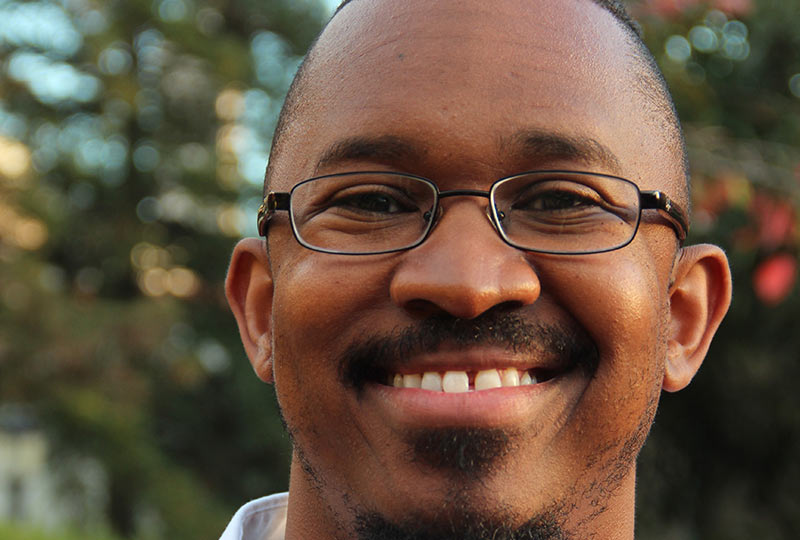
Photo: Marlena Telvick/UC Berkeley Graduate School of Journalism
Joshua Johnson likes to do voices. In the course of a few sentences, he can run a range from a fancy old-fashioned person to an endangered puppy. These theatrical flourishes are part of what make Johnson, the morning newscaster at KQED Public Radio, one of the most listened-to voices in California. Ben Manilla, an acclaimed audio producer and the academic coordinator for audio at UC Berkeley’s Graduate School of Journalism, calls Johnson “the future of public broadcasting.”
This semester is Johnson’s first at the Berkeley J-School, where he teaches a class on podcasting, but he has years of experience training KQED interns. In their program, they study newswriting, collecting sound in the field, taking pictures for the web, and how to pitch stories. After he spoke in Manilla’s class last year, Manilla invited Johnson to apply for the Berkeley position. “When we interviewed him to be a teacher, he blew away all the other candidates,” says Manilla. “He’s dynamic, energetic and full of great ideas.”
If you listen to Johnson tell it, a career in radio was inevitable. “The black experience is an experience of narrative. It’s how we share our culture and how we preserved our culture, from Africa, through the middle passage, through slavery to reconstruction. That’s the culture I was steeped in, so there’s no way I could have grown up without knowing how to tell a story. It was bound to happen,” he says.
Growing up in West Palm Beach, he was surrounded by lively storytellers, both in his home and at church. “I didn’t know what an Aristotelian story arc was or what the hero’s journey was, I never read Joseph Campbell, but I understood what made a good story. Having a hook, having something surprising, knowing what the funny part is, knowing what the nutty part is, being into the story that you’re telling, and knowing what’s the part that redeems,” says Johnson.
In his podcasting class, students are producing stories about the military, personal economics and more, and releasing them to the public through Soundcloud. The biggest challenge for most is getting on mic, which Johnson calls “inherently hard.” They’re also learning how to switch between writing for the eye and writing for the ear, as both skills are required in the current media landscape. And, finally, they’re learning how to end a show. “It’s easy to take off,” says Johnson. “Landing? That’s the thing you have to pinpoint.”
Johnson is markedly ambitious. When he was an undergraduate at the University of Miami, he studied everything and did everything: he took classes in jazz, LGBT studies, radio and television; hosted a game show and taught improv. Now, Johnson rises at 3:30 am to prepare for the morning show, and climbs into bed at 7:30 pm. In addition to reporting for KQED, he’s the creator and host of a limited weekly series called ‘So Well Spoken,’ which is about how Americans handle situations involving race and culture. “Physics teaches us that everything that creates light creates a little bit of heat, but not everything that creates heat creates light. News is exactly the same way. There are many stories that are highly sensational, highly heated, but they don’t illuminate anything,” Johnson says. “So what we’re trying to do is bring some light to the heat.”
Creating light is a tall order. So why add to a packed schedule by working at Berkeley?
“It’s not an industrial school for journalists, it’s a craft school for journalists,” Johnson says. “My students are good people to be around; I don’t get this sycophantic, ass-kissing, ‘gotta get the A plus in the class or else my parents are going to shoot me in the throat’ energy from them.” While many journalism schools have a reputation for being corporate or competitive, Berkeley students are “thoughtful and skeptical; they have a sense that they want to do work that they’re proud of, not merely work that will get them a job,” he says.
The desire to produce excellent work is one Johnson shares and often references. When I ask him what work he’s proudest of, he responds that he probably hasn’t done it yet. But he’s thought about what it would look like. “I have a devotion to journalism but also an affinity for performance. I would like to find something that merges original journalism across different forms of media with a live audience experience, somewhere between Bernard Shaw, Ed Bradley, Lester Holt and Arsenio Hall,” he says.
Before coming to KQED, Johnson spent six years working as an anchor and reporter in Miami, an experience that he says both burnt him out and made him tough. “It taught me that you can turn out great work quickly, that it’s not a matter of how long you work on something, it’s a matter of how you work on something, being ruthless with your time,” he says. “It taught me not to get so attached to stories that aren’t done.”
He brings that playful toughness into the classroom. “I want my students to work, stretch, and stress a little so they can feel it a little before they feel it in the professional world,” Johnson says, laughing. “I’d rather you sweat here for me so I can grow you and make you stronger than have you leave Berkeley thinking you’re ready and then reality hits you in the ass and you’re like, ‘I don’t know why I wasted a semester in Joshua Johnson’s class.’ I tell my students, ‘you’re free to hate me, as long as you learn.'”
by Melissa Batchelor Warnke (’17)
Dean's Newsletter

March 27, 2024
Quarterly Newsletter From Dean Geeta Anand
Spring 2024 Dear Berkeley Journalism community: With great optimism about the future of our school, I share with you news of the largest gift in the history of Berkeley Journalism:…

Quarterly Newsletter from Dean Geeta Anand
June 15, 2023

Quarterly Newsletter From Dean Geeta Anand
November 30, 2022
